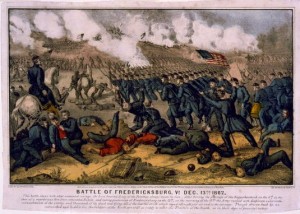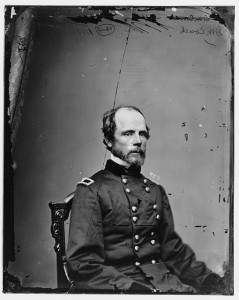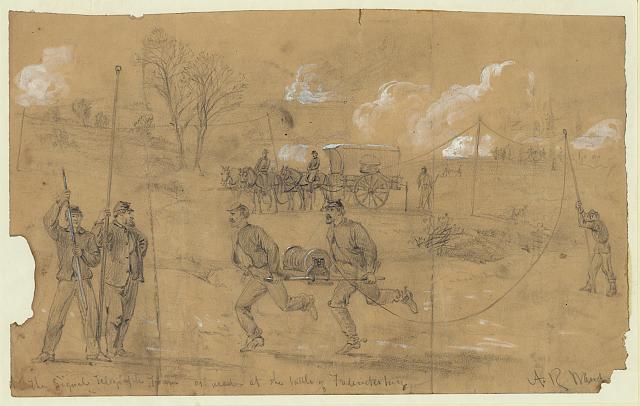150 years ago today citizens in the Confederate capital were getting more news of the Battle of Fredericksburg and starting to make more sense of their victory and their losses. From the Richmond Daily Dispatch December 15, 1862:
From Fredericksburg.
Great fight on Saturday.
the enemy repulsed at all points.
&c., &c., &c., &c.
Great anxiety prevailed in the community on Saturday, to hear further and more satisfactory reports from the seat of war, as precious rumors had induced the supposition that a general and decisive engagement was imminent; but no intelligence of a reliable character could be obtained until 9 o’clock P. M., at which hour the following dispatches were received at the War Department by General Cooper.
To General Cooper:
At 9 o’clock this morning the enemy attacked our right wing, and as the fog lifted the battle ran along the whole line from right to left until 6 P. M., the enemy being repulsed at all points. Thanks be to God!
As usual, we have to mourn the loss of many of our brave men.
I [ expect ] the battle will be renewed at daylight to-morrow morning.
R. E. Lee.
…
The highly gratifying nature of these dispatches only increased the general desire to learn something further, and throughout the day the bulletin boards in front of the various newspaper offices were surrounded by eager crowds in search of later intelligence. The War office was also besieged by anxious inquirers, but nothing of an official character was disclosed.
A telegraphic dispatch was received at the office of the Provost Marshal at 7 o’clock last night, stating that five ambulance trains were then between Hanover Junction and Guinea Station on their route to Richmond. Up to the hour of 12 o’clock P. M. none of the trains had arrived, though a large number of ambulances and backs were still awaiting them to convey the wounded to Seabrook’s Hospital. …
A soldier of A. P. Hill’s division says the enemy charged our men in their rifle pits and entrenchments nine times, and were repulsed with terrible slaughter, until our ammunition gave out, when our men were again charged in overwhelming force and driven back. But having obtained more ammunition, our forces in their turn charged the enemy and drove them from the works in great disorder, taking a large number of prisoners. …
Gen. Cobb was killed. Gen. Hood is also reported killed, but the rumor lacks confirmation. Gen. Gregg was mortally wounded.
Arrival of bodies.
The 5 o’clock train yesterday afternoon brought down the bodies of several officers. Among them were those of Brig.-Gen. Thos. R. R. Cobb, of Ga., and Capt. D’Aquin, of the Louisiana Guard Artillery.
Thomas Reade Rootes Cobb was “an American lawyer, author, politician, and Confederate officer …” Before the war he was well-known for his Inquiry into the Law of Negro Slavery in the United States (1858), which was
[t]he only legal defense of slavery produced by a southerner, Cobb’s treatise covered a vast range of arguments, from historical precedent and property rights to black inferiority.
Despite his arguments that the concept of slavery was good and formed the foundation of all great civilizations, Cobb deemed only African slavery to be acceptable in practice because he believed that God intended for blacks to be inferior to whites. Enslavement allowed white Christian masters to “improve” their slaves.
In his introduction to this book Cobb traces slavery back to Genesis and notes that the slave trade is at least as old as Joseph’s sale to merchants from Midian, who then sold him to Egypt.
___________________________________________________
150 years ago tonight the Union army moved back from Fredericksburg to the Falmouth side of the Rappahannock. From a Seneca County, New York newspaper in December 1862:
Our Army Retreats.
The Army of the Potomac evacuated their position on Monday night, and re-crossed the Rappahannock. The movement was a perilous one, but it was conducted in safety. The storm and the darkness of the night prevented the enemy from obtaining knowledge of our movement. The pontoon bridges were removed, thus cutting off all communication between the two shores. It is stated that our wounded are all safe on this side of the river.
A correspondent of the Tribune in describing the struggle on Saturday says, “it is not too strong an expression to say that in this battle we were butchered.” He says General French went into the action with 7,000 men. To-night, two days after the battle, but 1,200 men have reported to him!
The entire loss in the corps of Gen. Couch, consisting of the divisions of Gens. Howard, French, and Hancock, and which on the morning of the battle contained 40 regiments, old and new, amounting to at least 20,000, is about 10,000!
I think the official reports will not vary from this estimate more than 500 above or below the number.
The losses in Gen. Reynolds’ corps of Franklin’s grand division, which were at first supposed to be but two thousand are to night considered by some of Franklin’s staff officers nearly 4,000.
The same correspondent places the total loss at 13,500. The slaughter is described as terrible, and the disaster more humiliating than any that has befell us during the war.
Darius Nash Couch watched much of the action on December 13th from the cupola of Fredericksburg’s courthouse. Observing the repulse of French’s troops Couch reportedly said, it was “as if the division had simply vanished.”

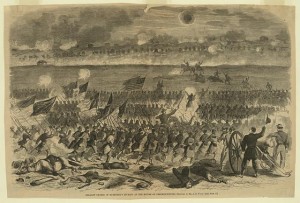
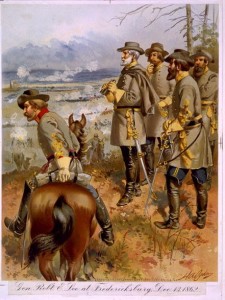
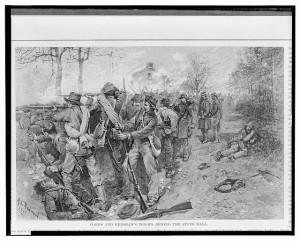
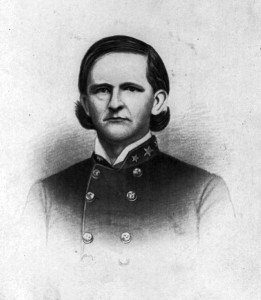
![Gen. Burndside [sic] visiting Gn. Franklin giving him the order to evacuate his position-on the battlefield on the right, Sunday Eve., all at rest (by Arthur Lumley, 1862 ca. December 14; LOC: LC-DIG-ppmsca-20776 )](https://www.bluegrayreview.com/wp-content/uploads/2012/12/20776r-300x268.jpg)
